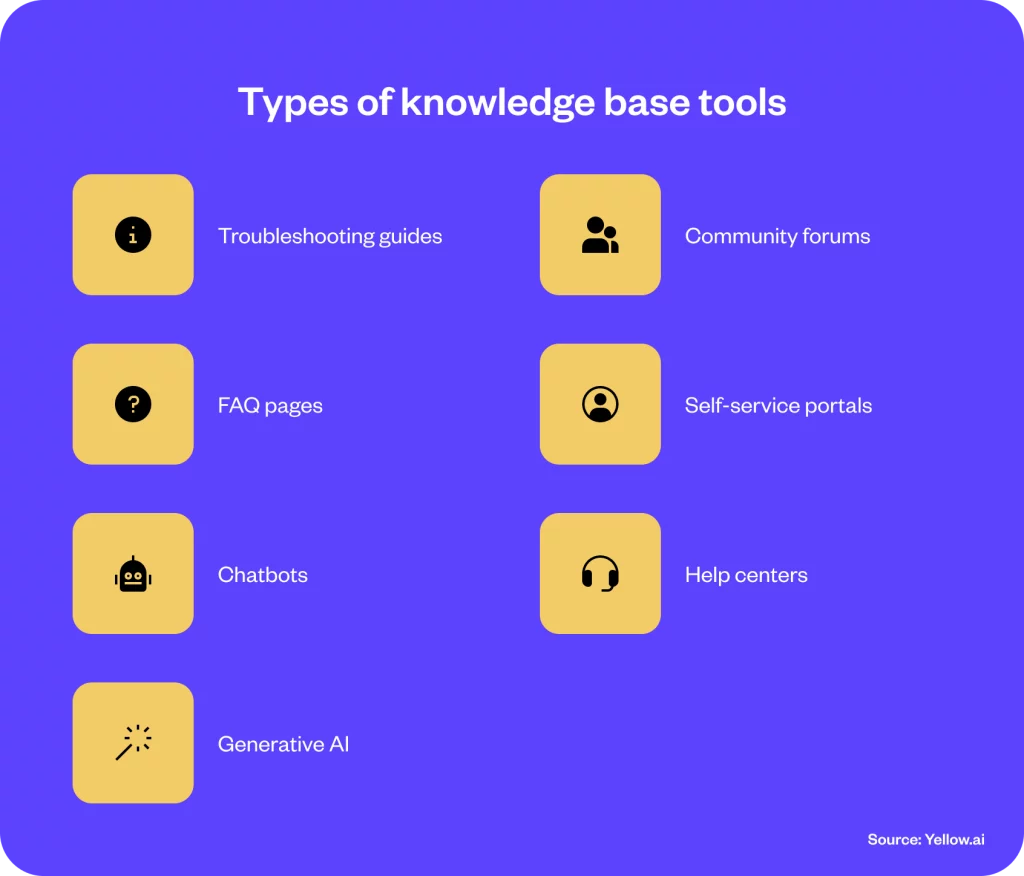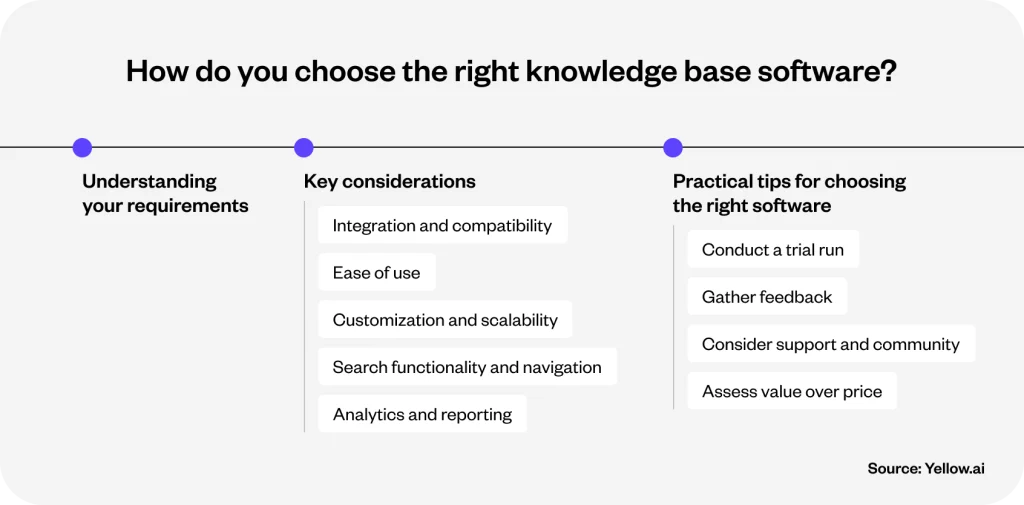Executive summary
Explore the essentials of selecting the perfect knowledge base software with this comprehensive guide. It is crafted to enlighten businesses on the importance of these platforms for enhancing customer self-service and improving team dynamics. From breaking down what knowledge base software encompasses to its varied types, significant benefits, and the selection process, this blog offers all essential insights. It will equip you with the necessary information to choose a knowledge base tool that best suits your business’s unique needs and objectives.
Did you know that 88% of customers expect a brand to offer an online self-service support portal? This statistic from Statista is a clear indication of the shift towards digital-first customer service. Knowledge base software is the unsung hero of customer support and team productivity. It is way more than just answering FAQs. A knowledge base software is about creating a hub where information flows freely, answers are just a search away, and your team can collaborate without barriers.
Choosing the ideal knowledge base software is not merely limited to ticking off features. It is about discovering a solution that seamlessly integrates with your business’s fabric. Think of it as a partner that preemptively addresses customer inquiries and also serves as a knowledge hub for your team. Ultimately, it enhances collaboration and efficiency. In the following sections, we will explain the intricacies of knowledge base software, highlight its key advantages, and guide you through selecting a platform that feels like it was custom-built for your business needs. Read on to transform your approach to customer service and knowledge sharing.
What is knowledge base software?
Knowledge base software stands as a cornerstone for efficient customer service and internal knowledge sharing in this digital-first world. But what exactly is this tool that’s becoming indispensable for businesses aiming to up their service game? At its core, knowledge base software is a specialized platform designed to store, organize, and share information. It is like a digital library that is accessible anytime, filled with articles, FAQs, and guides. This tool makes it easier for customers and employees to find the answers they need without waiting in line for assistance.
For businesses, the appeal of knowledge base software lies in its ability to streamline customer support and enhance self-service options. Imagine a customer browsing your online store for eco-friendly sportswear and wondering about your sustainability practices. Instead of sending an inquiry and waiting for a response, they could quickly access your knowledge base. Doing so will help them find a detailed article on your eco-friendly materials and proceed with their purchase. That is what knowledge base software brings to your business. This self-sufficiency boosts customer satisfaction and also reduces the workload on your support team. It allows your team to focus on more complex queries.
Knowledge base software is not merely about answering external questions. It is a goldmine for internal team empowerment. From onboarding new employees to providing step-by-step procedures for common tasks, it serves as a central hub for collective wisdom. This tool encourages a culture of knowledge sharing and continuous learning within organizations. That makes knowledge base software a key player in driving operational efficiency and developing a collaborative work environment. Ultimately, knowledge base software is a strategic asset that enhances both customer experience and internal workflows. That makes it a wise investment for businesses aiming to stay ahead of the competition.
Types of knowledge base tools
Navigating the vast landscape of knowledge base tools can be a game-changer for businesses looking to elevate customer support and streamline internal operations. Each type of tool serves a unique purpose, addressing different needs within the customer service spectrum. Let’s break down the options, keeping it straightforward and focused on the essentials.

1. Troubleshooting guides
These are your go-to resources for solving common problems. Simple, step-by-step instructions guide users through issues without needing to contact support. Let’s consider an example. For a software company, a troubleshooting guide might mean a guide that helps users troubleshoot installation issues and enable quick fixes without waiting for help.
2. FAQ pages
FAQ pages answer common questions in one spot. They are a time-saver, as they cut down on repetitive inquiries to your support team. For example, an online retailer might include shipping policies and return procedures here. It will give customers quick answers to common questions.
Related read: How to create a FAQ chatbot + examples, types, benefits
3. Chatbots
Chatbots provide instant support, using AI to answer questions anytime. They are like a 24/7 digital assistant for your website, as they guide visitors and offer help. For example, a chatbot can direct users to popular products or help with basic troubleshooting. It can enhance the customer experience without human intervention.
Related read: AI Chatbot – A Complete Guide for [2024]
4. Generative AI
Generative AI creates and updates content automatically. It keeps your knowledge base fresh. Furthermore, Generative AI adapts articles and FAQs as your products evolve. It ensures users always have the latest information. Imagine an AI that updates your help articles every time you release a new feature. That will make manual updates a thing of the past.
Related read: Generative AI – The ultimate guide for 2024
5. Community forums
Forums are where users share tips, solve each other’s problems, and discuss your products. It is a community-driven support channel that enriches your support with real user experiences. For instance, a tech company’s forum could be a place where users swap advice on using gadgets. It can create a valuable resource of user-generated solutions.
6. Self-service portals
These portals let users find information, solve problems, and manage their accounts on their own. It is all about empowering your customers to help themselves. For instance, a telecom company might offer a portal for bill payments and service troubleshooting. It can streamline the customer experience.
7. Help centers
Help centers are the comprehensive library of your support content, from articles to video tutorials. They are organized for easy navigation. Moreover, they let users find exactly what they need. For example, a cloud services provider might use a help center to house setup guides and security tips. It gives customers a one-stop shop for support.
Why do you need a knowledge base system?
Today’s world is a fast-paced digital environment. Here, information is more than just a resource; it’s the currency of customer satisfaction and operational excellence. That makes a knowledge base system beneficial and essential for businesses aiming to thrive. Here’s why:

1. Self-service customer support
Businesses often grapple with the challenge of balancing high-quality customer support with the reality of finite resources. The knowledge base system offers a digital solution to empower customers to help themselves. By providing a comprehensive repository of answers to frequently asked questions, how-to guides, and troubleshooting instructions, a knowledge base system significantly reduces the volume of support tickets. This shift frees up your support team to tackle more complex queries. Furthermore, it also caters to the modern customer’s preference for quick, self-directed problem-solving.
For instance, a customer encountering a minor software issue could find a step-by-step troubleshooting guide in your knowledge base. It will help them resolve the issue on their own and come away with a positive view of your brand’s support infrastructure.
Tips for businesses
- Regularly update your knowledge base with new information and answers to recently asked questions.
- Use clear, concise language and include visuals to enhance understanding.
- Implement a feedback system to improve the resources based on user interaction continuously.
2. Team collaboration and knowledge-sharing
The second pivotal area is internal operations. A knowledge base is not merely an external tool for customers. It is a powerhouse for internal team collaboration and knowledge-sharing. It acts as a centralized platform where employees can access necessary information, share insights, and learn from each other’s experiences. This collective intelligence establishes a culture of knowledge-sharing, reduces repetitive inquiries among team members, and streamlines onboarding processes.
Imagine a scenario where new hires can independently navigate through a well-structured internal knowledge base to understand company policies, project workflows, and product details. That will accelerate their acclimatization and productivity.
Tips for businesses
- Encourage employees to contribute their expertise to the knowledge base.
- Organize content into easily navigable categories.
- Regularly review and update content to keep it relevant and accurate.
3. Employee productivity
A knowledge base system directly impacts employee productivity by minimizing time spent searching for information. When employees have immediate access to a well-organized repository of company knowledge, they spend less time inquiring and more time performing their core responsibilities. This efficiency accelerates task completion and enhances job satisfaction. Moreover, it reduces the frustration associated with information bottlenecks.
Tips for businesses
- Ensure the search functionality is robust and intuitive.
- Promote the use of the knowledge base for on-the-job learning and problem-solving.
- Monitor usage patterns to identify areas for improvement and expansion.
4. Customer retention
Customer retention depends on your business’s quality of support and the autonomy to find solutions. A knowledge base system enhances both by providing round-the-clock access to problem-solving resources. This empowerment leads to increased customer satisfaction, loyalty, and the likelihood of repeat business.
When customers know they can easily find answers to their questions, their trust in your brand grows. Subsequently, they are more likely to become advocates for your products or services.
Tips for businesses
- Highlight the most valuable and frequently sought-after information.
- Optimize content for SEO to ensure customers can find solutions via search engines.
- Regularly solicit customer feedback to identify gaps in your knowledge base and opportunities to add value.
How do you choose the right knowledge base software?
Choosing the right knowledge base software for your business comes down to understanding what you need and making sure the software fits those needs perfectly. Here’s a straightforward way to think about it:

Understanding your requirements
Before diving into the sea of available knowledge base software, start by defining what you need. Consider whether you are aiming for an external customer-facing solution, an internal repository for your team, or both. Evaluate the volume of content you plan to manage and the level of customization you will need to match your brand’s aesthetic.
Key considerations
1. Integration and compatibility: Ensure the knowledge base software seamlessly integrates with your existing tools and systems. It should complement your customer service software, CRM, and any other platforms your team uses daily. This integration enhances efficiency and allows for a smoother flow of information across different channels.
2. Ease of use: Both your team and your customers will interact with the knowledge base, so its usability is paramount. Look for intuitive interfaces that require minimal training. Test the software’s user experience from both an editor’s and an end-user’s perspective to ensure it’s straightforward and accessible.
3. Customization and scalability: Your chosen solution should not only reflect your brand’s look and feel but also grow with your business. Assess the software’s customization options and its ability to scale. As your business evolves, your knowledge base should adapt. It should accommodate more users, content, and increasingly complex needs.
4. Search functionality and navigation: A powerful search engine within your knowledge base is crucial for users to find answers quickly. The best knowledge base tools offer advanced search features, including auto-suggestions and tagging, to streamline the search process. Effective navigation and categorization further enhance the user experience. That makes information discovery effortless.
5. Analytics and reporting: Insights into how your knowledge base is being used can inform improvements and highlight gaps in your content. Opt for software that provides comprehensive analytics on page views, search terms, and user feedback. This data is invaluable for optimizing your knowledge base and ensuring it fully serves its purpose.
Practical tips for choosing the right software
- Conduct a trial run: Before committing, take advantage of free trials or demos offered by the software providers. This hands-on experience will give you a clearer picture of the software’s capabilities and limitations.
- Gather feedback: If possible, involve a diverse group from your team in the evaluation process. Different perspectives can highlight varied needs and potential issues that you might not have considered.
- Consider support and community: Look into the level of support offered by the provider. Additionally, a vibrant user community can be an excellent resource for tips, best practices, and additional support.
- Assess value over price: While budget considerations are important, assess the value the software brings to your business. A slightly higher-priced option that significantly improves customer satisfaction and team efficiency may offer a better return on investment in the long run.
17 Best knowledge base software (2024)
Knowledge base software is pivotal for enhancing customer support and internal knowledge sharing. The best solutions can transform how businesses manage and disseminate information.
Let’s explore the top 17 knowledge base software that you can choose from.
1. Yellow.ai
In the realm of digital transformation, Yellow.ai emerges as a beacon for businesses seeking to revolutionize their knowledge base systems. Beyond mere tools, Yellow.ai represents a comprehensive solution designed to seamlessly integrate into your organization’s fabric, enhancing customer self-service and team productivity through cutting-edge technology.
- Advanced Natural Language Processing (NLP): Yellow.ai’s NLP technology goes beyond basic interactions, understanding, and interpreting user queries with remarkable accuracy. It ensures users find exactly what they need, reducing frustration and elevating the self-service experience.
- Intuitive No-code platform: With Yellow.ai, creating and updating your knowledge base is a breeze, thanks to its no-code interface. It democratizes the process, allowing team members across your organization to contribute without the need for technical expertise.
- Multilingual support: Break language barriers with Yellow.ai’s multilingual capabilities, offering global customers the convenience of accessing information in their preferred language, thus expanding your reach and inclusivity.
- Seamless integration: Yellow.ai fits perfectly into your existing ecosystem, offering robust integration with CRM, ticketing systems, knowledge bases and other essential business tools, creating a unified platform for all customer interactions.
- Data-driven insights: Leverage the power of analytics with Yellow.ai to gain insights into user behavior and knowledge base performance, enabling continuous improvement and content optimization.
- Automation and live chat: Combine the efficiency of AI with the personal touch of live support. Yellow.ai provides instant answers to common questions, while the option for live chat ensures complex queries are handled with a human touch.
2. Zendesk
Zendesk is an AI-powered knowledge base software for flexible solutions for IT, HR, and customer-facing help centers. The software provides insights into customer needs, suggestions for new content, and prompts to update existing articles. Its generative AI features help write new articles, create conversational AI responses, and improve semantic search results. Zendesk’s Team Publishing tool allows teams to review, approve, and publish content, while the Content Blocks feature allows for creating and placing content blocks in relevant articles.
With it, the user can create a self-service portal for customers or employees. Security features such as single sign-on, two-factor authentication, and IP restrictions protect against unauthorized access to content. Pricing starts at $55 per agent/month, with a 14-day free trial available.
Key features:
- AI-powered content suggestions
- Generative AI article creation
- Semantic search capabilities
- Team Publishing for collaboration
- Multi-language support
3. Helpjuice
Helpjuice knowledge base software is customizable, enabling businesses to manage content effectively and enhance customer service. Its powerful search engine ensures users quickly find necessary information. The intuitive WYSIWYG editor facilitates immediate article creation and publishing. AI-driven algorithms recommend article topics and suggest content improvements, while detailed analytics highlight popular articles and search trends. Customizable themes and multilingual support enable a tailored and globally accessible knowledge base, ensuring a seamless brand experience. The software is priced at $120 per month for up to four users, with a 14-day free trial available.
Key features:
- AI-driven content recommendations
- WYSIWYG editor for article creation
- Advanced search capabilities
- Detailed analytics and reporting
- Customizable themes and multilingual support
4. Freshdesk
Freshdesk knowledge base software optimizes support operations with its intuitive rich text editor, streamlined article creation, and efficient content management features. It empowers agents and technical writers to create and maintain self-help resources, including articles, videos, and images. With support for template creation, multi-language capabilities, and SEO optimization, Freshdesk ensures that content is accessible and widely discoverable. Its cloud storage supports multimedia guides, making it an ideal, scalable solution for growing businesses. There is a free trial, you may consider it to test.
Key features:
- Rich text editor
- Seamless article creation process
- Versions and translations
- Content management
- SEO capabilities
5. Help Scout
Help Scout is a customer service platform that includes Docs, a knowledge base software. It enables users to create visually appealing articles in minutes. Docs allows users to upload images and videos, use AI assist to adjust article tone or length, and even translate them into languages like Spanish, German, and Chinese. Users can also access Beacon, a web widget that embeds a chat-style widget. Docs integrates with the shared inbox, allowing agents to share links to knowledge base content in customer conversations directly. A free trial is available. And the basic plans start at $22 per user/month.
Key features:
- Quick article creation
- AI-assisted content adjustments
- Seamless Beacon widget integration
- Direct link sharing in conversations
- SEO-optimized content
6. Zoho Desk
Zoho Desk is a ticketing system and help desk solution extending knowledge base software. It offers customizable structures for how-to articles, FAQs, and self-service options. It allows writers and editors to create content using collaboration tools, control access to the knowledge base by creating accounts, and customize themes and branding. One can explore its community forums for customer collaboration. The knowledge base can function independently, categorizing content like how-to articles, FAQs, and demo videos for enhanced discoverability. It also facilitates collecting, organizing, analyzing, and reusing existing company knowledge to improve customer support efficiency. Pricing starts at $7 per user/month, with a free plan and 15-day free trial available.
Key features:
- SEO optimization tools
- Collaboration tools
- Detailed history views
- Automated article suggestions
- Multilingual proficiency
7. Bloomfire
Bloomfire is an innovative knowledge base software designed for effective internal knowledge sharing. Its AI-powered search engine can transcribe video content, making information easily accessible. This platform enables businesses to organize knowledge in a centralized location, mimicking social media interactions with features such as likes, shares, comments, and follows. Bloomfire supports collaborative content creation, allowing users to crowdsource FAQs and build comprehensive repositories. The software’s reporting features provide insights into content engagement and areas for improvement, enhancing customer service and operational efficiency. Starting at $460 per month for up to 50 users, billed annually. A 30-day free trial is available.
Key features:
- AI-powered search engine
- Video content transcription
- Social media-like engagement
- Collaborative FAQ creation
- Robust reporting features
8. Guru
Guru knowledge base software facilitates creating, sharing, accessing, and updating information, enhancing customer service efficiency. It unifies relevant data from existing tools like chat, email, and CRM systems and organizes it into easily accessible “cards.” With AI-powered features, Guru identifies internal experts to streamline information retrieval. The platform allows setting user permissions and viewing revision history. Businesses can leverage Guru’s analytics to compare engagement metrics against benchmarks, ensuring continuous improvement. Additionally, Guru’s API enables the external publication of internal content. The software prices start at $10 per user/month, billed annually. A 30-day free trial is available.
Key features:
- Slack integration for real-time notifications
- AI-powered answers
- Engagement analytics
- Org chart management
- HRIS sync
9. Document360
Document360 knowledge base software offers both public and private knowledge bases to streamline customer service and internal team collaboration. It features an intuitive interface, supporting both markdown and WYSIWYG editors for content creation. The software facilitates real-time search, version control, content categorization, and secure file management. Document360 enables businesses to efficiently produce how-to guides, tutorials, and technical documents. Collaboration tools allow writers and editors to discuss and review drafts seamlessly, while article view permissions ensure data security by requiring logins for access. Free trial (14-day) and plan available. Paid plans start at $149/project per month (includes three users).
Key features:
- Real-time search capabilities
- Markdown and WYSIWYG editors
- Version control for documents
- Content categorization and organization
- Secure file management
10. Notion
Notion knowledge base software gives flexibility for creating kanban boards, checklists, text documents, and more. This multifaceted tool functions as an internal wiki, project management solution, and collaborative workspace, making it ideal for efficiently organizing and accessing company knowledge. Notion’s customization features allow businesses to tag, label, and assign ownership to articles, ensuring a well-structured and searchable knowledge base. Permission settings further control user access and actions, enhancing data security and management. The free plan is for personal use. Paid plans start at $8/user per month. A 7-day free trial is available.
Key features:
- Customizable knowledge base templates
- Kanban boards for project management
- Collaborative writing and editing
- Tagging and labeling for organization
- Permission settings for user access
11. HappyFox
HappyFox knowledge base software helps improve customer service through effective content management and self-service options. It offers multi-brand user portals, enabling businesses to manage different brands from a single platform, thereby streamlining support processes. The software also features feedback collection mechanisms and distinct systems for internal and external knowledge management. HappyFox’s intuitive search engine, auto-suggest capabilities, and structured index guide customers efficiently, while its rich-text editor facilitates seamless content creation and categorization. This tool is handy for businesses seeking to improve customer engagement and operational efficiency. The software cost starts at $29 per agent/month, billed annually.
Key features:
- Multi-brand user portals
- Feedback collection mechanisms
- Customizable client portals
- Content categorization and indexing
- Rich-text editing for content creation
12. Confluence
Confluence knowledge base software enhances internal collaboration and project management. Developed by Atlassian, Confluence integrates seamlessly with other Atlassian products, providing a unified platform for content creation and management. It offers a library of page templates. Users can create team spaces, set permissions, and track document changes for content auditing. The software’s real-time co-authoring, editing capabilities, and user comments enhance collaboration, ensuring accuracy and up-to-date information. Confluence’s analytics tools monitor content performance and user engagement, helping businesses maintain an efficient and effective knowledge base. Starting at $6.05 per user/month, with a 7-day free trial available. Free plan for up to 10 users.
Key features:
- Extensive page templates library
- Seamless integration with Atlassian products
- Real-time co-authoring and editing
- User permissions management
- Analytics for content performance
13. HubSpot Service Hub
HubSpot Service Hub offers a sophisticated knowledge base software that seamlessly integrates with its CRM and marketing ecosystem. It allows businesses to transform FAQs into a searchable repository of solution articles, video tutorials, and guides. The platform consolidates customer information into a single location, streamlining support and improving customer experience. HubSpot’s knowledge base includes built-in reporting dashboards, SEO recommendations, and article tagging for enhanced searchability. Additionally, the multilingual capabilities and CMS editor for brand customization make it a versatile tool for global customer support. The pricing for Service Hub starts at $100 per seat/month.
Key features:
- Built-in reporting dashboard
- Multilingual knowledge base
- SEO recommendations for optimizing articles
- Tagging articles with relevant search terms
- Customizable brand with CMS editor
14. Nuclino
Nuclino is an AI-based knowledge base solution that aids users in creating structured documents. It generates ideas, writes content based on keywords, and summarizes notes. This software simplifies document creation and project management, eliminating the need for multiple tools. It offers a user-friendly interface with text, images, videos, and tasks, enhancing collaboration and collaboration in real-time. Companies can set access restrictions to control content views, edits, and contributions. Several users can work together, editing and commenting on documents in real-time. The platform also includes an article version history tool for tracking changes and revisions. There are templates for designing wikis, product roadmaps, and handbooks. Starting at $0 per month with limited features. A 14-day free trial is available.
Key features:
- AI-assisted content creation
- Real-time collaboration and commenting
- Access restrictions for content control
- Article version history tracking
- Pre-designed templates for quick setup
15. ProProfs Knowledge Base
ProProfs Knowledge Base software is an advanced option that helps businesses develop comprehensive internal repositories and manage online documentation efficiently. The platform’s intuitive WYSIWYG editor allows teams to create, customize, and manage content seamlessly. ProProfs enables conditional content display based on the reader’s device or segment, and its reporting capabilities offer insights into article views, user interactions, and content performance. Achieve teamwork by using collaboration tools and ensuring up-to-date and organized documentation. The software supports workflow processes, guiding users through content creation, review, and approval stages, fostering a culture of continuous learning and productivity. This software cost starts at $0 per month for one author. A 15-day free trial is available.
Key features:
- Online document categorization
- Ready-to-use templates
- Privacy control settings
- Detailed reporting capabilities
- Collaboration tools for team efforts
16. ServiceNow
ServiceNow offers a robust and scalable solution for building knowledge bases, catering to both team and customer needs. This platform supports the entire knowledge management lifecycle, from creation and categorization to review and approval of articles. Users can search, browse, and provide feedback on content, enhancing continuous improvement. ServiceNow’s framework meets Knowledge-Centered Service (KCS) validation requirements, making it ideal for organizations prioritizing structured and validated knowledge management. The software supports integration with other tools, reusable content blocks, and translation management, ensuring seamless knowledge dissemination and accessibility. Custom pricing is available.
Key features:
- Integration with Microsoft Word Online
- Loom predictive intelligence
- Feedback management tools
- Knowledge-Centered Service v6 verified
- Group ownership capabilities
17. Slite
Use Slite knowledge base software to document and manage company information effectively. It leverages AI for writing improvements, answers to queries from its centralized repository, and insights into team usage, helping ensure the database is always up-to-date and helpful. Slite integrates seamlessly with Google Drive, Notion, Slack, and Zapier. Its user-friendly interface features a document editor that supports various media types, making it an ideal choice for teams seeking efficient knowledge management and real-time collaboration. One can opt for a free trial for 14 days, then switch to paid plans starting at $8/month per member (billed annually) or $10/month per member (billed monthly).
Key features:
- Document editor with multimedia support
- AI writing assistant for summaries and simplifications
- Automation for creating recurring notes
- Real-time collaboration with task assignments
- Document verification
- Multilingual search with source support
The final thoughts on knowledge base
As you have come this far, you have gained a substantial grip on the meaning and types of knowledge base software, highlighting its crucial role in modern businesses. We discussed selecting suitable knowledge base software by considering key features, cost, and business objectives. Additionally, we reviewed some of the best knowledge base software options available in 2024. The modern business landscape emphasizes the importance of a comprehensive knowledge base, empowering stakeholders with the right information at the right time. The shift from simple FAQs to AI-driven platforms is a significant step towards more engaged, informed, and satisfied users and teams.
Investing in knowledge base software is essential for enterprises aiming to enhance customer service and internal efficiency. This software particularly benefits customer support, providing streamlined access to critical information.
The international knowledge base software market is projected to expand rapidly by 2028, driven by the need for customer retention and the introduction of innovative software solutions. The integration of generative AI has resulted in radical transformation, especially in automating article creation, offering personalized recommendations, enabling intelligent chatbots, and supporting multiple languages. Worldwide, North America dominates as the leading market shareholder and is set to expand at a CAGR of 10.3% during the forecast period till 2031. As these trends evolve, knowledge base software will become more intelligent, effective, and scalable, delivering superior self-service experiences for customers and reducing business support costs.
Frequently asked questions (FAQs)
What is knowledge base software?
Knowledge base software is a specialized tool that businesses use to organize and share information with customers and within their teams. It’s essentially a digital library that contains helpful resources like FAQs, tutorials, and guides, making it easier for users to find the answers they need quickly.
Why is knowledge base software important for businesses?
Knowledge base software is vital because it streamlines customer support by allowing users to solve problems on their own, reducing the demand for support staff. For internal use, it boosts efficiency by centralizing company knowledge, which facilitates easier access and sharing among team members.
What are the key features to look for in knowledge base software?
Look for user-friendly design, powerful search capabilities, customization to match your brand, easy content management, multilingual support, integrations with other business tools, and analytics to track usage and effectiveness.
Can knowledge base software help with SEO?
Yes, knowledge base software can significantly aid SEO efforts. Since it hosts a wealth of searchable, valuable content, it improves your site’s visibility on search engines, driving organic traffic and establishing your authority in your industry.
How to implement knowledge base software effectively?
Define your goals and user needs first. Organize your content clearly, ensure it integrates well with your existing systems, involve your team in its upkeep, and use feedback to refine and improve it continually.
Can knowledge base software integrate with other tools and platforms?
Most definitely. Modern knowledge base systems are designed to work seamlessly with a range of other software, such as CRM and ticketing systems, enhancing overall efficiency and providing a more unified user experience.
What are the best practices for maintaining a knowledge base?
Keep your content up to date and accurate, encourage contributions from across your team, optimize your articles for search engines, monitor user interactions for insights, and regularly seek feedback to identify areas for improvement.
What are a few knowledge base software examples?
There are several examples of the best knowledge base software available in 2024. The list of top KB software includes Zendesk, Helpjuice, Freshdesk, Help Scout, Zoho Desk, Bloomfire, Guru, Yellow.ai, Document360, Notion, HappyFox, Confluence, HubSpot Service Hub, Nuclino, ProProfs Knowledge Base, Slite and ServiceNow.
What is the best free knowledge base software?
Depending on the company’s objectives and size, one can choose from a number of the best free knowledge base software. Apart from free plans, there are free trials that range from 7 days to 30 days. Yellow.ai, Zendesk, Freshdesk and Helpjuice have free trials. For example, Zoho Desk and Notion have a free trial and free plan to start with.




















